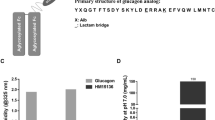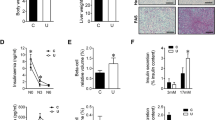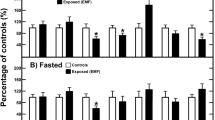Abstract
ADMINISTRATION of mannoheptulose to fasted rats causes hyperglycaemia1. This is due to a decreased supply of insulin as well as an increase in gluconeogenesis2. The insulin lack persists as long as mannoheptulose remains in the body. Thus the transient diabetes of the intact rat can be greatly prolonged by nephrectomy to prevent excretion of mannoheptulose3.
This is a preview of subscription content, access via your institution
Access options
Subscribe to this journal
Receive 51 print issues and online access
$199.00 per year
only $3.90 per issue
Buy this article
- Purchase on SpringerLink
- Instant access to full article PDF
Prices may be subject to local taxes which are calculated during checkout
Similar content being viewed by others
References
Simon, E., and Kraicer, P. F., Arch. Biochem. Biophys., 69, 592 (1957).
Simon, E., Kraicer, P. F., and Shelesnyak, M. C., Endocrinol., 71, 83 (1962).
Kraicer, P. F., and Simon, E., Acta Endocrinol., 47, 517 (1964).
Simon, E., and Kraicer, P. F., presented at the Fifth Congr. Intern. Diabetes Federation, Toronto, July 20–24, 1964. Coore, H. G., and Randle, P. J., Biochem. J., 93, 66 (1964).
Coore, H. G., Randle, P. J., Simon, E., Kraicer, P. F., and Shelesnyak, M. C., Nature, 197, 1264 (1963).
Author information
Authors and Affiliations
Rights and permissions
About this article
Cite this article
SIMON, E., KRAICER, P. Effect of Pretreatment of Rats with Mannoheptulose on the Glucose Tolerance. Nature 206, 942–943 (1965). https://doi.org/10.1038/206942a0
Issue date:
DOI: https://doi.org/10.1038/206942a0
This article is cited by
-
Insulinsekretion in vitro
Diabetologia (1966)



